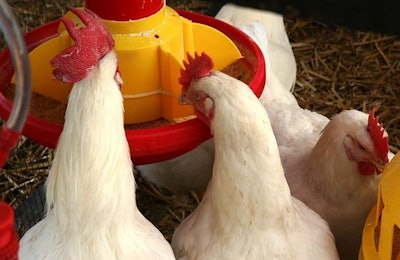
The International Poultry Council (IPC) disagrees with the recently approved World Health Organization (WHO) guidelines that recommend that the meat and poultry industries stop the routine use of antibiotics for growth promotion and disease prevention, the IPC said in a statement.
The WHO on November 7 stated that over-use and misuse of antibiotics in animals and humans is contributing to the rising threat of antibiotic resistance, as it released its WHO guidelines on use of medically important antimicrobials in food-producing animals:
However, IPC says that the WHO guidelines “inappropriately tie the hands of producers and limit their options" for antibiotics to prevent, control and treat diseases.
The full IPC statement reads:
“The IPC is very concerned that the WHO guidelines inappropriately tie the hands of producers and limit their options for using antimicrobials for prevention, control and treatment of diseases based on specific need. The ability of a trained veterinarian to prescribe the correct treatment at the right time is paramount for minimizing antimicrobial use and ensuring a viable supply of healthy birds that is vital to a safe global food supply.
“In developing guidelines that impact human and animal life, one would trust that ‘evidence’ drives policy recommendations and not ‘associations,’ as done in this WHO approach. The guidelines are framed by an article published this week in the journal The Lancet Planetary Health and, as WHO noted, is based on ‘low-quality evidence’ or in some instances ‘very low-quality evidence.’
“The IPC remains committed to a ‘one health’ collaborative approach that balances the knowledge and scientific expertise of all stakeholders to ensure we act responsibly in using all antimicrobials – for human and for animal needs. The IPC encourages WHO to be more inclusive of the veterinary community in its work so its deep expertise can guide proper antimicrobial use and animal care.
“In April, members of the International Poultry Council adopted a landmark Position Statement on Antimicrobial Use and Antimicrobial Stewardship Principles, which charts a path for the global poultry industry to follow on the responsible and efficacious use of antimicrobials in poultry production.
“The IPC position statement sets a science-based course for the global poultry industry to follow that safeguards the efficacy of antimicrobial usage while at the same time addressing the issues of resistance, bird welfare, food safety, and concerns of consumers.
“In that statement, the IPC acknowledges that antimicrobial resistance is a global concern and that the poultry industry must adopt management practices that reduce the use of those antimicrobials for which resistance could pose the greatest global risk. The statement encourages the global poultry sector to be proactive in its engagement with its stakeholders and to implement practices that advance the ‘one health’ objectives espoused by WHO, the World Organization for Animal Health (OIE), the Food and Agriculture Organization of the UN, and the Codex Alimentarius Commission that lead to healthy people, healthy animals, and a healthy planet.
“As noted in the IPC position statement, prudent therapeutic usage of antimicrobials will minimize their overall usage, particularly those that are most critical in human medicine. Moreover, it is the poultry industry’s ethical responsibility to provide proper and humane care to the animals it produces. The IPC is committed to a science-based risk analysis approach with regard to assessing the impact of antimicrobial usage in animal agriculture, rather than the associative approach that forms the basis of the WHO guidelines.”
NPPC also questions WTO guidelines
Representatives of the poultry industry are not the only ones to question the WTO guidelines. The National Pork Producers Council has also challenged the WHO, stating that “A ban on disease prevention uses of antibiotics in food-animal production being advocated by the World Health Organization would be ill-advised and wrong.”
Comprehensive resource for antibiotic-free poultry production available
A new collection of exclusive articles, blogs, infographics and videos on antibiotic-free poultry production, by trusted WATT Global Media editors and industry experts, equip poultry producers and marketers with information to help them make critical business decisions. Purchase your copy.

















